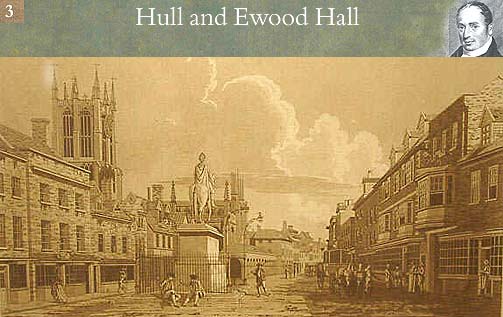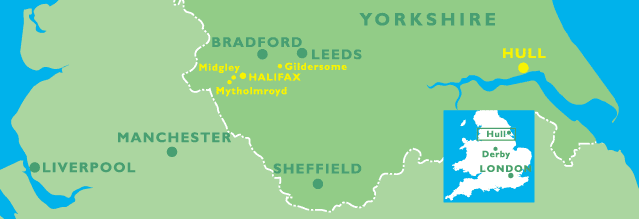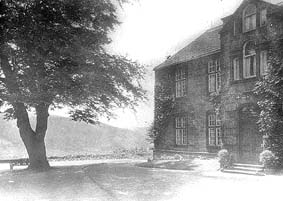
'Kingston upon Hull', by Thomas Malton, 1780.

Just when William Ward moved from Stafford to Hull is not clear, but, in the issue of the 'Hull Advertiser' of 2nd January, 1796, the proprietors printed a statement thanking readers for past support and 'at the same time we must acknowledge that in consequence of one of the Proprietors and late Editor having left Hull, their paper has not always been so correct as they could have wished, but having now engaged a person as editor who has some time ago established and successfully conducted a respectable country newspaper, and whose time will be wholly devoted to the superintendence of the 'Hull Advertiser', they hope that it will be conducted in a manner worthy the liberal patronage with which it has been honoured.' (1)

William Wilberforce. Courtesy 'The Centre for the Study of the Life and Work of William Carey D.D., 1761 - 1834'.
William Wilberforce, who led the campaign for the Abolition of the Slave Trade in the House of Commons, was a native of Hull and had been born there on 24th August, 1859. His grandfather; a merchant in the Baltic trade, lived in Wilberforce House, and William Wilberforce had been Member of Parliament for Hull from 1780-1784. During Ward's editorship he was Member of Parliament for Yorkshire (1784 -1812). In 1787 Wilberforce had converted to Evangelical Christianity and was a prominent member of the 'Clapham Sect'.
After the disagreements of the early Baptist church in Derby, Ward seems very quickly to have felt at home in Hull. He had successfully learnt his trade as a newspaper editor and his new employer was satisfied with his work. According to Stennett, it was in Hull 'that he first found a religious home, and ever after he cherished the most lively recollection of the pleasures he had there experienced'.
Ward initially attended the Baptist ministry of Mr. Beatson in Salt-house Lane, but when that pastor's failing health meant he could no longer carry out his duties, the congregation could not agree on a successor. A number of members invited Rev. W. Pendered to preach to them. They formed a church and met in a room above the Exchange. They later built a meeting house in George Street, and it was there that William Ward was baptised, on 28th August 1796. He was received into membership one week later, on 4th September. Stennett says he became a 'useful and honourable member during his residence in that town'.
He also made close friendships with a few individuals with whom he continued to correspond throughout his life - Mr. Carlil, Mr. Greenwood and Mr. Sedgwick. At the home of the latter he was 'a frequent and welcome guest, and regarded almost as one of the family'.
In October 1796 he is believed to have been in London, visiting relatives who were in trouble and Stennett quotes letters sent from there (and other letters), that reflect the intellectual turmoil going on in his mind as a new convert.
Ward had occasionally presided at religious meetings and preached in villages around Hull. Through one of his friends he came to the notice of a wealthy Christian benefactor called Mr. Fishwick of Newcastle-upon-Tyne, who offered to pay for his ministerial training and enthusiastically encouraged him to become a minister. Ward's qualifications for such a training were recognised by his church.
The effect of this turn of events is graphically described in a letter Stennett quotes. It is written by Ward, to a friend, on 20th July 1797:
'I thought I had been fixed at Hull; I had a pleasant lodging facing the Humber, refreshed by its gales, inviting me to its banks, gratifying me by its passing current, and its stately barks. I was occupied in a situation, in which I often indulged my pen and my fancy, to the satisfaction of my employers. I was surrounded by friends, on whose smiles I impudently fed. My mind was calm, and I had some leisure for my friends and my books. Sometimes I walked with Eugenio to the country house of a friend, and we cheered the hours of darkness with the tale of friendship. Sometimes I called upon him for the evening walk; at other times we exchanged the friendly epistle; and sometimes I went into the villages, to gladden the hearts of my fellow men with 'good tidings of great joy'.
In the midst of these employments and pleasures I received an invitation to go to Ewood Hall - to leave Hull - perhaps for ever!! Conscience commands me to go - to enter a new line of life - to combat difficulties and prejudices - to be subject to the cavils of the bigot, and the frowns of the dissipated - to incur the displeasures of the mermaids of professors, half sinners, half saints - to live, perhaps, on thirty pounds a year - to warn men night and day with tears - to tremble, lest I might be a cast away, and that the blood of the damned souls should be required at my hands. Who is sufficient for these things?
If you feel any of that sincere regard, which I trust you do, for the person in these circumstances, I hope that you will pray for him and advise him. Oh! to be animated with the ardour of Paul ; 'I am ready not to be bound only at Jerusalem for the name of Jesus, but to die for his sake'.
He was sent by Mr. Fishwick, to Ewood Hall (2), Mytholmroyd, near Halifax, Yorkshire, in August 1797. Ewood Hall was an academy run by Rev. Dr. Fawcett who took two or three theological students each year.


Ewood Hall, Mytholmroyd, Yorkshire, circa 1930. From the collection of the Central Reference Library, Halifax. Reproduced courtesy Calderdale Council. Calderdale Local Studies Library. Ward pursued his classical studies there. 'In addition to the Word of God, he read, with much application the different standard works which explain and illustrate it.'
Stennett quotes a reference to Ward in the 'Memoirs of Dr Fawcett': 'A residence of about a year and a half, at Ewood Hall endeared Mr. Ward as much to the family, as his exertions on behalf of the heathen have raised him in the esteem of the public. They witnessed the first appearance of that missionary spirit, which induced him afterwards to relinquish every other engagement for this sacred cause. His most delightful employment was to preach in hamlets, wherever he could collect a congregation; and by the dispersion of short tracts, &c. to lead careless, as well as enquiring souls, to a serious attention to the best things.'
Ward writes to a friend: 'I find a good air and good men, good companions; I feel no want of the pipe, or wine, or anything else, but more love to God, and the company of my friends. All the family are obliging, and here is an intelligent young man, that prints for Mr Fawcett, who makes me a cheerful companion'.
The preaching of the Gospel 'was his favourite employ, and he embraced every opportunity'.
Half a mile away, in Midgley, he established a week-day lecture. There, in a simple cottage, he stood on a three-legged stool, and preached 'with fervour and affection' to a room packed full of local people. He continued these meetings throughout his time at Ewood Hall and when he was unavailable, Samuel Stennett would take his place.
He occasionally assisted Dr. Fawcett and had requests from 'more distant and destitute churches' to take up permanent positions with them. One in particular was Gildersome, some seventeen miles away, where he occasionally preached. Ward's answer was that he would wait three years until his training was complete before he could consider any such proposal.
Ward writes: 'On Saturday I walked seventeen miles on a preaching errand, being disappointed of a horse. The rains descended, - the winds blew; and the floods came; but 'God tempers the wind to the shorn lamb!'. My feet were sore, and my stockings were wet; in other respects I fared pretty well'.
The effect of his labours (sometimes taking three services in a day) was to increase the number of churches in the neighbourhood of Ewood Hall.
In the Autumn of 1798, a member of the Baptist Mission Committee visited Ewood Hall with the intention of 'gaining an insight into the Printing business, which was carried on there', and held many conversations with William Ward. Ward must have remembered his walk with William Carey, in London, in March 1793. He had 'never expressed his feelings about the subject' before. In the many conversations he had with the Committee member he 'avowed his readiness to engage in this great cause'.
Ward was now 29.
(1) 'Early Hull Printers and Booksellers: an Account of the Printing, Bookselling and Allied Trades from their beginning to 1840', by C. W. Chilton. Published by Hull City Council, 1982. Chilton acknowledges that this new Editor is probably William Ward.
(2) For more information on Midgley, John Fawcett, Ewood Hall and Mytholmroyd click on this link.